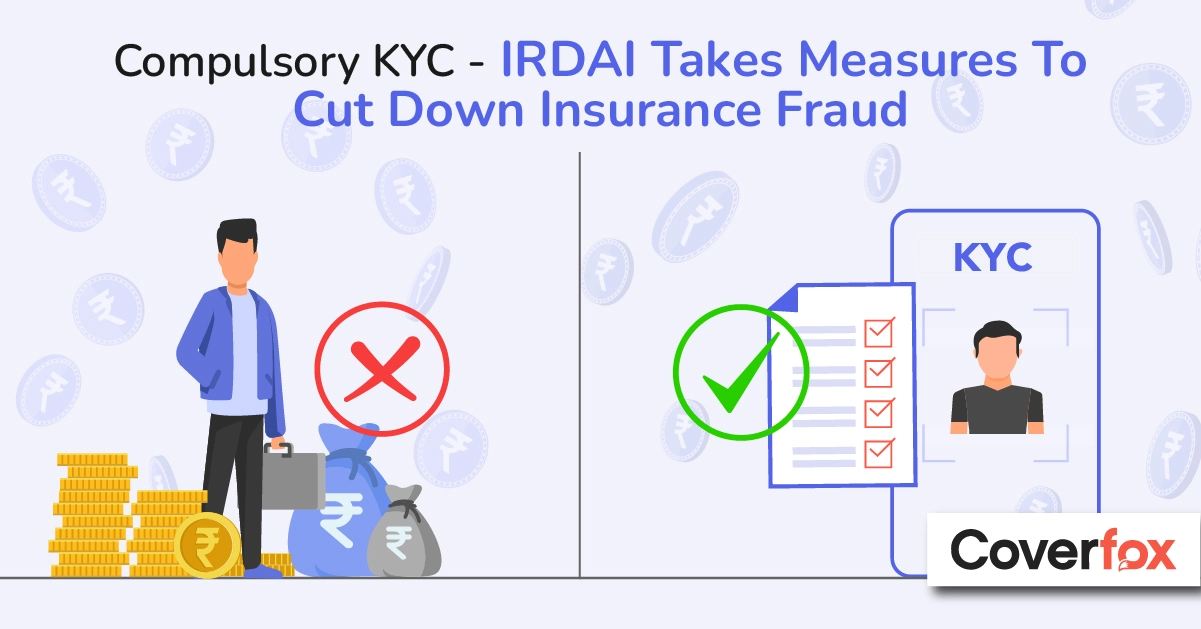IRDAI issued regulations against insurance fraud like money laundering on 1st August 2022. IRDAI updated master guidelines on Anti Money Laundering (AML) for general insurers.

To prevent insurance fraud, the Insurance Regulatory Development Authority of India (IRDAI) has made it compulsory for all policyholders to provide their KYC details before buying an insurance policy (both life and non-life) irrespective of the premium amount. Earlier KYC was not compulsory for general insurance and was required only at the time of making claims for a claim amount of more than ₹ 1 lakh.
IRDAI issued regulations against insurance fraud like money laundering on 1st August 2022. IRDAI updated master guidelines on Anti Money Laundering (AML) for general insurers and also defined procedures for the KYC verification, to be followed by the general insurance companies during the onboarding process.
This blog will highlight some of the key points of IRDAI’s new KYC regulations.
Key points to know about IRDAI’s KYC and AML regulations for Insurers
Collecting KYC details from all new policyholders can help insurance companies in checking insurance fraud in the future to a great extent. Given below are some important points to note about IRDAI’s KYC regulations.
All insurance providers are required to perform KYC as specified below
KYC for Individuals
- Conduct KYC to find out the true identity of a customer and remove anonymous and fake applications.
- Keep separate procedures for new and existing customers.
- Verify the recent photo, identity, and address of the customers.
- Customers whose residential address is different from the address mentioned in Aadhaar need to provide a self-declaration.
KYC for Entities
- Conduct KYC to identify an entity and its owners.
- Verify the authorisation of owners who control the entity and on his behalf all transactions. are carried.
- Verify the legal status, name, and proof of the existence of the entity.
- Verify the registered address of the entity.
- Verify the authorised individual acting on behalf of the entity and the powers regulating it.
- Any anonymous or fake accounts should not be allowed by insurance companies.
An insurance provider can conduct KYC using different KYC processes. Processes that are accepted by IRDAI are
- Aadhaar-based KYC authentication in online mode.
- Aadhaar-based KYC verification in offline mode.
- Digital KYC according to the PML (Prevention of Money-Laundering) rules.
- Video-Based Identification Process or VBIP is conducted live through VKYC service providers or through in-person verification done on a video.
- Using KYC identifier allotted to a customer by CKYCR.
- Using original KYC documents of the customers called Officially Valid Documents (OVDs) including passports, driving licenses, voter’s ID cards, employment cards, etc.
- Using PAN/Form 60 documents.
All insurers should follow the Client Due Diligence (CDD) process as per PML Rule 9
CDD is the process of background checks of a customer before onboarding. Guidelines issued by IRDAI for CDD are;
- For new customers, the insurer should conduct CDD with valid KYC documents of the customer at the time of onboarding.
- For existing customers, the insurer should conduct CDD with KYC documents on an ongoing basis depending on the data obtained previously. In case, KYC for an existing client is not available, collect it within 2 years for low-risk clients and within 1 year for high-risk clients.
- Conduct continuous CDD for existing clients at the time of any additional financial transaction or if there is a sudden change in the client’s activities.
- Conduct verification at the time of claims before making payouts.
All insurers should conduct a risk evaluation and classification of customers to mitigate money laundering risks.
Insurers should evaluate the risk associated with a customer depending on his identity, financial and social status, nature of business, and location of business. Classification of customers based on risk
- Individuals/entities whose source of income and identity is recognised and whose transactions are as per the specified norms are classified under low-risk profiles e.g. Salaried individuals, government-owned businesses, people from lower economic sections of society, etc. A simplified Due Diligence (SDD) is conducted in such cases with just the basic KYC verification. An SDD is done by the insurers for individual policies with premiums less than ₹ 10,000 p.a.
- Individuals/entities whose source of income is not clearly defined or recognised come under high-risk profiles and require high KYC verification e.g. Non-residents, HNI individuals, NGOs, trusts, firms having sleeping partners, politically exposed persons (PEP), etc. Enhanced Due Diligence (EDD) is carried out in such cases.
Insurers are required to share the KYC data with the Central KYC Registry (CKYCR).
All insurers are directed to submit the electronic copy of a customer’s KYC to CKYCR within 10 days of starting an account-based relationship in case the customer does not have a KYC identifier and his KYC records are not registered in the CKYCR database. An insurer can rely on third-party KYC as per the conditions specified under the KYC guidelines.
Conclusion
The updated KYC and AML guidelines aim at preventing insurance fraud and money laundering activities and are expected to have an impact on the KYC processes followed by insurance companies. The implementation of these reforms will result in a robust and secure insurtech infrastructure and smooth client onboarding.
Related Articles
- New Insurance Rule by IRDAI: KYC mandatory for buying new health, Auto insurance from January 1, 2023
- KYC Process in Car Insurance